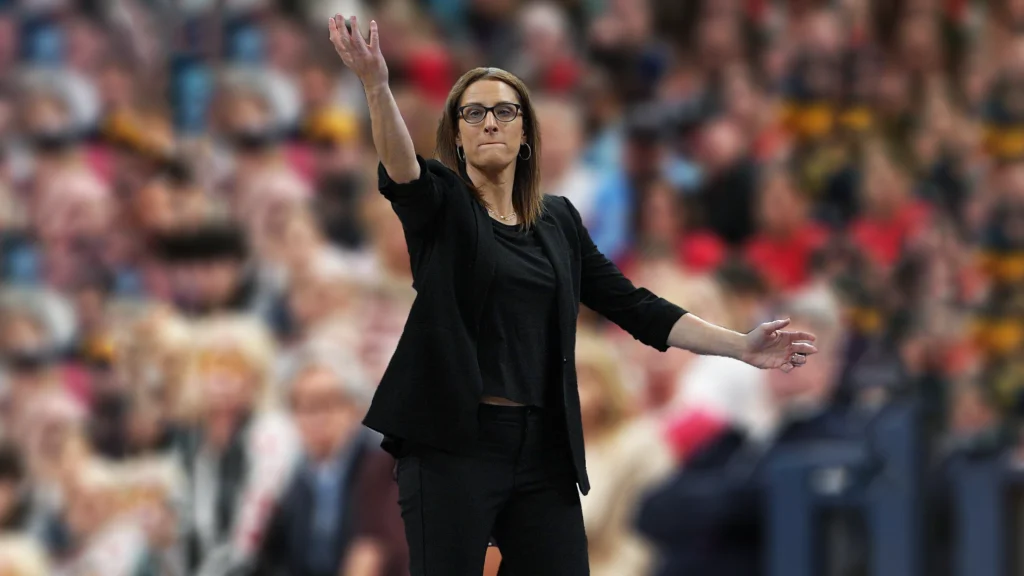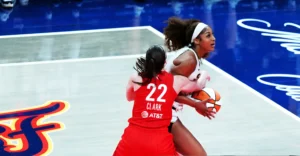
Indianapolis– In a fiery postgame response following a dramatic 90–88 loss to the New York Liberty, Indiana Fever head coach Stephanie White voiced strong criticism of the WNBA’s officiating, calling it both “pretty egregious” and “disrespectful.” White’s remarks followed a highly contested matchup on May 24, 2025, that ended in controversy after rookie phenom Caitlin Clark was denied a foul call in the game’s final moments. The incident has since sparked wide-ranging conversations across the league regarding officiating consistency, fairness, and treatment of emerging players.
The game’s climactic sequence saw Clark attempt a game-winning shot with seconds left on the clock. As she drove toward the basket, she was met by Liberty guard Natasha Cloud, who stripped the ball cleanly according to the referees. However, the absence of a foul call despite significant contact drew immediate outrage from Fever players, fans, and especially White, who was visibly upset on the sidelines and continued her protest postgame.
“It was pretty egregious,” White stated to reporters. “We’ve talked about consistency in officiating all season, and this kind of ending is unacceptable. We’ve got young players out there giving everything, and they deserve fair treatment.” White’s words were underscored by broader concerns about how referees handle high-pressure moments involving high-profile rookies like Clark.
Adding fuel to White’s frustration was the glaring free throw disparity. The Liberty were awarded 32 attempts from the charity stripe, while the Fever managed just 15. “It’s not just one call,” White emphasized. “It’s the cumulative effect over the course of a game that tells you something isn’t right. We’re not getting the same respect, and it shows.”
The coach also hinted at broader systemic issues, suggesting that the WNBA needs to reevaluate how it trains and evaluates its officiating staff. “These aren’t isolated incidents,” she added. “When you have multiple games where the calls are lopsided or unclear, you have to start asking tough questions.”
While Stephanie White stopped short of alleging intentional bias, her pointed remarks align with a growing chorus within the WNBA community calling for more transparency and accountability in refereeing. Several former players, analysts, and fans have taken to social media and sports platforms to voice their agreement, arguing that inconsistent officiating undermines the league’s credibility and the players’ hard work.
For Caitlin Clark, the moment marked another chapter in what has already been a headline-grabbing rookie season. Known for her fearless style of play and rising star power, Clark has quickly become a focal point for opposing defenses and, increasingly, for controversial no-calls. Despite the outcome, she finished the night with an impressive stat line and poise, refusing to let the officiating overshadow her team’s performance.
On the other side of the court, the New York Liberty, led by Sabrina Ionescu and Jonquel Jones, defended their victory as hard-earned and dismissed any claims that the officiating tilted the outcome. “We played tough, we played smart, and we closed when it mattered,” Ionescu said in the postgame press conference.
However, White’s comments have placed pressure squarely on the league’s front office. According to reports, the Fever plan to file a formal inquiry with the WNBA seeking clarification on the game’s officiating decisions. It remains to be seen whether the league will issue any public response or officiating review, but the debate is unlikely to fade soon.
As the WNBA continues to grow in visibility and popularity, particularly with stars like Caitlin Clark drawing unprecedented viewership, the league’s ability to uphold consistent and fair officiating will remain under the microscope. For Stephanie White and the Indiana Fever, the message is clear: fair play isn’t just about the scoreboard—it’s about respect, integrity, and the future of the game.

